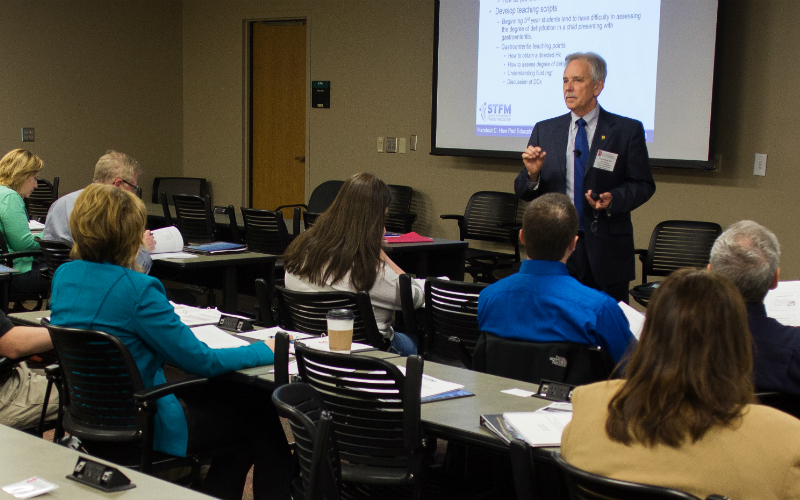Faculty Development Delivered provides a customized faculty development workshop for your institution or program to help you meet ACGME and/or LCME requirements, save on travel expenses, and provide CME opportunities. Our faculty use interactive methods to engage your faculty and promote evidence-based teaching principles.There are two options: a half-day workshop and a full-day workshop. Choose from the 12 provided topics (listed below) to create a customized 4- or 8-hour workshop specific to the needs of your program or institution.Workshops can be virtual or in-person. Pay one lump sum and invite your faculty and preceptors to participate.
Benefits of Faculty Development Delivered
Stay at Your Institution or Program
Eliminates the need for expensive and time-consuming travel
Looking Ahead
Helps your program define actionable plans and next steps
Earn CME
Approved for up to six prescribed credits by the American Academy of Family Physicians
ACGME and/or LCME
Meets accreditation requirements for faculty development
Use What Works
Encourages the adoption of evidence-based teaching principles
Post-Workshop Follow-Up
Includes a follow-up consultation with your program director or department chair
Testimonials From Workshop Attendees
"The facilitators were top notch! They were great to work with in the preparation of the content for the workshop, their content was on point, and they utilized very reputable resources to gather content for their talks. They were very poised presenters and great facilitators of meaningful conversation (which can be difficult on virtual/online platforms) that will be a huge asset to our new program."
"Thank you for an excellent and interactive workshop! I love that the strategies were very relevant to the clinical setting as residents-learners and teachers. I appreciate the SMART goals and practice with strategies so they stick."
"Thank you for this workshop. It has stimulated much discussion for our faculty and will result in follow-up faculty development and changes."
"Loved this workshop. As a new attending, it provided me with a great baseline about a standard of teaching residents. Appreciated the practice and enthusiasm from the presenter."
More About Faculty Development Delivered
How Does It Work?
- Select your topics. Review the topic list and choose one topic to cover in depth, or a variety of topics that interest you. You can create your own 4- to 8-hour experience.
- Connect with us. Complete an interest form (DOC) and email it to Melissa Abuel, or call (800) 274-7928. She helps you fine tune your workshop so it meets your needs.
- Pencil it in. Once we know dates, topics, and presenters, we sign an agreement and put it on our calendars.
- Invite your faculty and your community preceptors. Decide who you want to invite. Invite your local faculty and preceptors. We can provide flyers and text for marketing emails. As part of your workshop, STFM provides three free 1-year memberships for faculty who are not current STFM members. Just send us their names!
- Host your event. You need a couple of volunteers to greet attendees and assist the presenters(s). We also encourage you to provide refreshments. You need to make sure your attendees have computer access to the handouts. Our presenter(s) take it from there, offering innovative family medicine education at its best.
What Workshop Topics Are Available?
Choose from the topics below to create your customized 4- to 8-hour workshop presented by some of our most highly rated speakers. This is innovative family medicine education at its best.
Topics
- Competency-Based Medical Education
- Resident Feedback and Assessment
- Scholarly Activity: What It Is and How to Do It
- Core Outcomes, Competencies, Sub-Competencies, and Milestones
- Best Practices for Clinical Competency Committees
- Inpatient Teaching
- Working With Learners in Difficulty
- Giving Effective Lectures and Presentations
- Curriculum Design: Planning, Implementation, and Evaluation
- Quality Improvement
- Grant Writing
- Faculty Wellness and Burnout
How Much Does a Workshop Cost?
- Half-day; Virtual (4 hours): $4500
- Full-day; Virtual (8 hours): $6500
- Full-day; In-person (8 hours): $8500*
Questions?
If you have questions, contact Melissa Abuel at (800) 274-7928, ext 5593 or the email link below.
CONTACT STAFF WITH QUESTIONS
